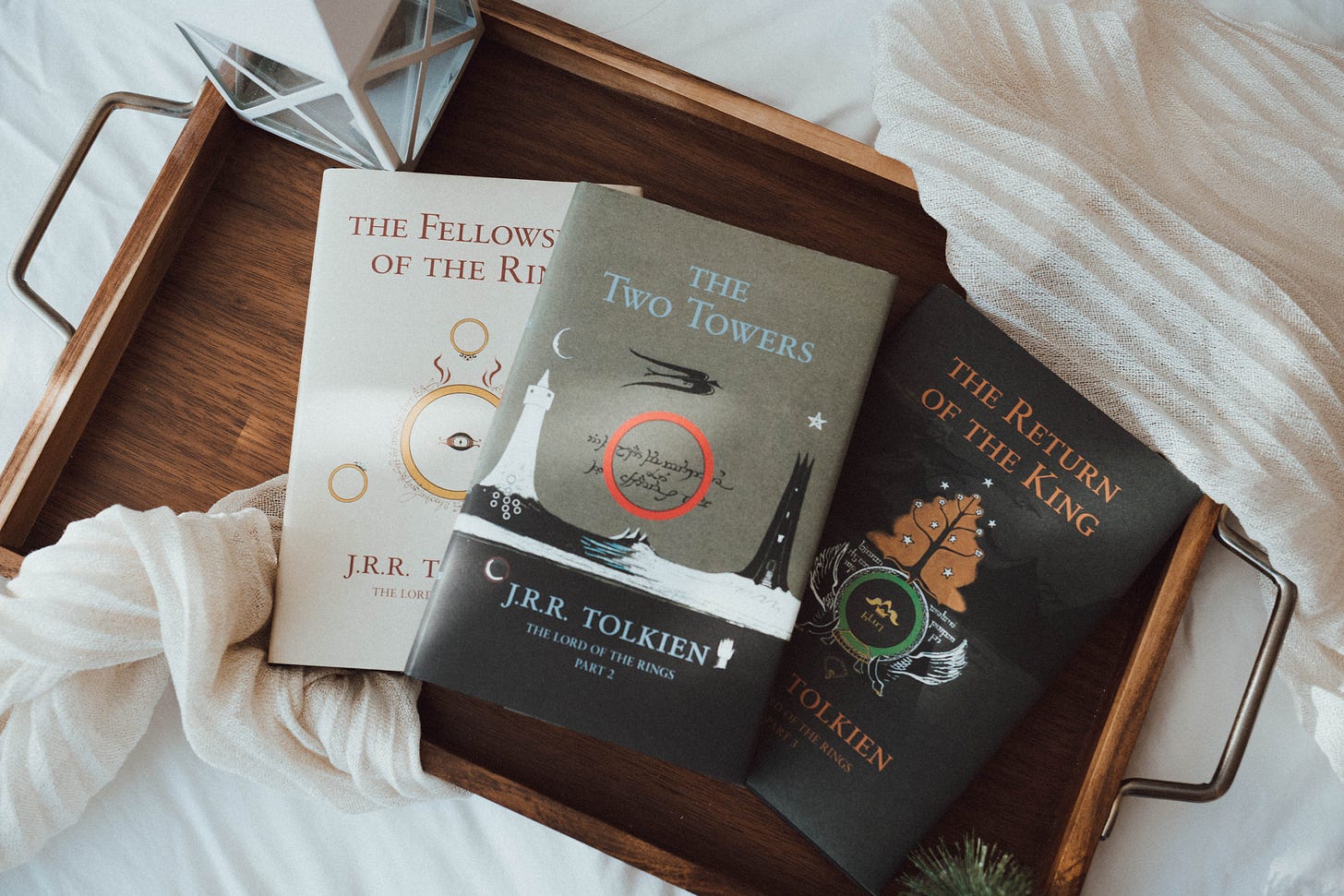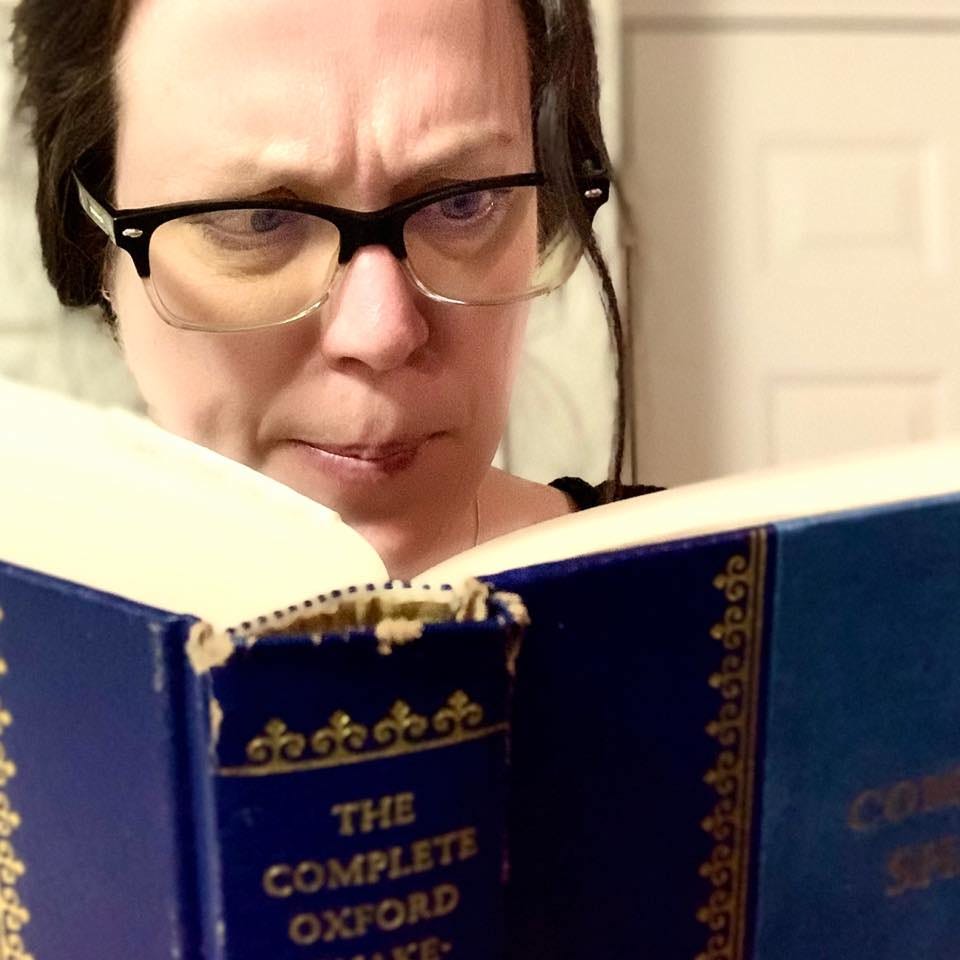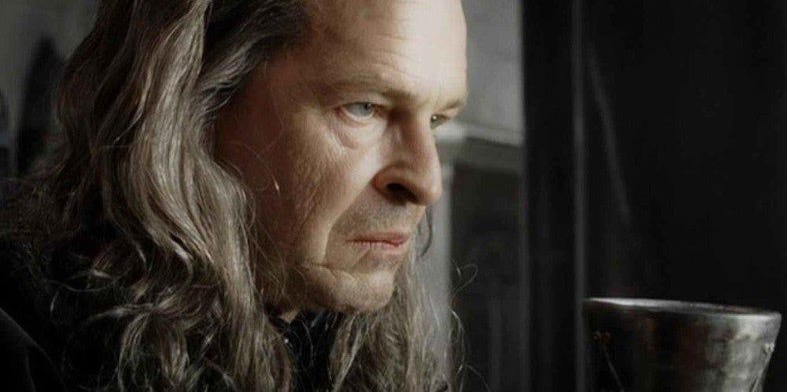Hello, I’m Tiffany, your resident town hermit. Welcome to my fellowship—a haven where you’re free to talk about taboo subjects you can’t anywhere else.
Dear Inklings,
We are finishing The Return of the King by J.R.R. Tolkien this week. If you’re new here, my essays for this book challenge will always be free to read, but the journaling exercises and discussions are for patrons only. I also share more of my personal experiences in that section. We will be going deep and I want the space to be an intimate one. I hope you will choose to participate in our Fellowship.
Click here for the main page and reading schedule.
Today’s guest essay is brought to you
, an actual badass whom I had the honour of meeting in person during a Colorado trip earlier this year. And yes, she is just as cool as she seems. Also, there’s just something special about taking the online offline, so I do like to do that as much as possible. It was wonderful.Jenn brings together many of the themes and threads, which makes this a fitting conclusion to our reading. Enjoy!
AUTHOR’S NOTE: Back in 2004, I taught a graduate-level literature course called ‘Hobbits and Heroes’ over at DU, in their Professional Writing Masters program. It being 2004, the Peter Jackson movies had just come out, the Hobbit movies weren’t even a glimmer in anyone’s eye, and I had a whole 10 weeks to go through this rich material with my students. We read a bunch of fairy tales and some epic tales, read the Hobbit and the whole LOTR trilogy, then discussed (but didn’t read) the Silmarillion’s lore and the intensive worldbuliding, centered on languages, that made up Tolkien’s Middle-Earth.
I first re-shared the lecturettes for the old course on my blog about ten years later (the class was a very early example of online learning–I think we must’ve used an old form of Blackboard? Ew. anyway…) and then a couple years ago when I started my Substack, I published them in a series here for Zuko’s Musings. Those re-publishings were largely unchanged since their first appearance in that class. For
’s LOTR reread, though, I wanted to expand this one into something a little longer, ask you all a few more questions, and do just a little more exploring of these concepts, to join in all the spectacular dialogue that’s surrounding it. Thanks, Tiffany, for having me on as a guest, and I hope to get a bunch of comments so we can continue this discussion I began 20 years ago in class.Now. Let’s get crackin’!
A Brief History of the Origin of Evil in Middle-Earth:
Melkor (“he who arises in might”) was jealous of Eru [the One] already before Arda [the world] was created, and wanted to be king of other wills himself. When Eru revealed the results of their song to the Ainur [Vala and Maia], Melkor was one of the first to descend into it, mainly from this desire. …when the Valar finally rested, he and his followers [downfallen Ainur, like Sauron and the later Balrogs] attacked their dwellings and destroyed their Two Lamps [precursors to the Two Trees and the sun and moon].
…the Noldor first named him Morgoth, “dark destroyer of the world”. With the aid of Ungoliant [mother of the giant spiders, including Shelob] he also managed to destroy the Two Trees and bring darkness to Valinor, before he fled. Because Morgoth dispersed his essence all over Arda, it is said that all of Arda outside of the Blessed Realm has some evil in it, this being the Morgoth-element.1
The essence of evil in Middle-earth centers around selfishness, the desire to be ‘king of other wills,’ the intense protection of ego to subordination of all else, and ‘lacking imaginative sympathy’2 is usually the fatal flaw by which this evil is ultimately vanquished. Sauron is not the biggest baddie of Middle-earth: Morgoth really is the Root of all Evil, though he is not dead, but chained and diminished during the time of the trilogy. Remember that Sauron, the Balrogs, and Ungoliant were Morgoth’s loyal subordinate servants back in the day. Even though Sauron is an extremely powerful, if non-corporeal, presence by the time the events of LOTR occur, we must remember that he is but a Maia (like Gandalf and Saruman), whereas Morgoth is a Vala, a higher level being and much more powerful. Thank goodness Morgoth is out of commission in Middle-earth at the time of our story—if Sauron, his lieutenant, can wreak this much havoc and fear on the world, imagine what Morgoth himself must have done, way back when he ruled from Utumno.
‘Nothing is evil in the beginning. Even Sauron was not so.’
—Gandalf, in the Council of Elrond
But They Were All Of Them Deceived
Well, Gandalf should know, he being of the same type of being as Sauron, and most likely knew Sauron before Morgoth convinced him to turn to evil.3The worst kind of evil, the kind which flatters and seduces, is examined over and over again in LOTR; each time a baddie is defeated, he is given a chance for redemption, and true colors will out when one looks at the choices each character makes. Back before Sauron died and came back, he was handsome and well-spoken, enough so to fool the Elves into forging Rings for him. His deception is much akin to Saruman’s voice: betrayal masked behind a fair façade.
But Sauron’s return to life isn’t into a more powerful and radiant form, like Gandalf the Grey’s resurrection into The White. Sauron is a terrifying Eye, a void with a dominating presence (oxymoron? maybe), and though he may not be corporeal, his entire twisted existence during the trilogy is centered on dominance. He is the ’king of other wills’ and the only thing that hinders his utter domination and thereby destruction of Middle-Earth is the fact that the One Ring is not in his possession. Even so, his influence is enormous, and between hordes of orcs and powerful individuals like Saruman and Denethor, his world domination is almost complete.
And this is Sauron’s one little ventilation tunnel into his Death Star: he expects everyone else to want to dominate, too. That some don’t want this and might choose a truly peaceful path doesn’t even occur to him, which is why Frodo and Sam are able to get that far into Mordor in the first place, and why they’re ultimately able to get right inside Mount Doom.
‘With the logic of ambition [Sauron] expects some one of the Western leaders to turn the power of the Ring against him. But with the lack of imagination that characterizes the self-involved he cannot conceive that they may refuse power and decide to destroy the Ring instead.’4
Corruption: Saruman and Denethor
Saruman and Denethor are more men of intelligence than men of action, in contrast to our redeemed fallen figures, which I’ll talk about in a minute. They both, in their peak of good work, prized knowledge greatly, and in particular the knowledge of the darker arts. Both have one of the palantìr and both use it, but, foolishly (as with the seductive trap of the Ring) they both think they can wrest its power from Sauron and rule as a great power in his stead. It’s the same trap as with the Ring: anyone who wields it for use, even if they begin with good intentions, will quickly fall to evil as long as they use it. This rotting descent is how both these wise men come to their doom: they begin to think like Sauron: only of domination, and so they play right into his hands, and both for similar reasons.
Saruman’s Fall
Saruman does not take the chances for redemption given him, not when Orthanc is first taken, nor later when he meets the leftover party on the road as a beggar. His corruption is not easily erased, however, as the hobbits find out when they return to the Shire. He has ruined the Shire on his own ruinous way down, and even in death there is no redemption for him. He falls at the hands of his miserable minion Wormtongue, made more miserable by Saruman’s treatment of him, until Wormtongue (now only Worm) breaks, pulling his weakened master down with him into death, into the dirt. As high as Saruman’s lofty wise ways held him before his corruption, even so low is his undignified downfall, stabbed in the back by a simpering lackey.
In Saruman mainly (but in Denethor as well), we see the imminent danger of incautious knowledge gain. Kocher discusses this in his essay on the Nature of Evil in Middle-Earth: ‘Knowledge is not a good in itself,’ he notes. ‘It is not allowed to remain neutral on Middle-Earth, but is good or ill depending on the use to which it is put.’5 The moment both this wizard and this man decide to choose their own glory over the greater good, that’s when their fall begins. And the more they use their palantìr, the more they play into Sauron’s deceptive clutches. Saruman still thinks he’s in control of his palantir peerings, while it can be argued that Denethor caves to Sauron’s control, thinking all is lost because of the disinformation he’s been fed.
Denethor’s Fall
Denethor, being a proud man of the blood of Númenor, is easily tricked into believing he has control of his palantìr at first, because Sauron is quite familiar with such pride as Denethor displays, and so can easily feed him the information he chooses until his collapse into despair and suicide (and attempted filicide). The path Denethor follows is no doubt just like the fall of the Nine Kings of Men who are now the Ringwraiths: if Denethor had had the One Ring (or any of the Rings of Power), he’d have become a Ringwraith as well. As it is, his life is over even before Gandalf and Pippin arrive, and once they get there and especially after he makes the dire mistake of gazing into his palantìr at that point, his mind gets twisted far into the depths of despair. And a man in despair feels that there’s nothing to be done, no hope, no good action that can be taken, that all is already lost.
‘Denethor is sunken in a dark nightmare whereinto the light of reason and fact cannot penetrate.’
Denethor achieves no redemption in his death, as suicide is not considered an honorable way to go in Middle-earth. Here, Gandalf admonishes Denethor, already in madness, against the sin of suicide (emphasis my own):
“Authority is not given to you, Steward of Gondor, to order the hour of your death…and only the heathen kings, under the dominion of the Dark Power, did thus, slaying themselves in pride and despair, murdering their kin to ease their own death.”
Both these corrupted men are partially (at least) ruined by their high knowledge. Or, maybe it’s that they’re extra corruptible because of their immense knowledge? Certainly they both got carried away in their intensive study of the dark arts in particular, which is something that Elrond warns us about at the Council in Fellowship: ‘It is perilous to study too deeply the arts of the enemy, for good or ill.’ The more both Saruman and Denethor delve into study of Sauron, the further they both fall under his spell–the temptation of becoming the ‘king of other wills’ that will depose Sauron, yes, but not usher in a new era of peace, but sit on his throne themselves. This is Denethor’s lament, when he hears of Boromir’s death and then hears the news from Faramir, as to where Frodo has gone with the powerful weapon that is the Ring. There is no winning, no survival even, to Denethor without that dominating power, and that’s what makes him not only annihilate himself, but attempt to dispatch his gentle son Faramir along with him, mistaking Faramir’s quiet wisdom for weakness. Just like Sauron has done.
Yet You Comfort Me
Gimli’s high level courtesy in Lothlorien is the epitome of redemption when it comes to the racial tensions between elves and dwarves. Gimli hangs on to his dignity when confronted with the blindfolding on the way in to Lorien–Legolas calls it ‘the stiff necks of Dwarves’ but it isn’t stubbornness or pride; it’s just Gimli demanding he be treated like an equal. Aragorn recognizes this, and calls Legolas out on his hypocrisy when he in turn recoils against the shame of sharing Gimli’s blindfolded fate.
‘Hear, ye Elves! Let none say again that dwarves are grasping and ungracious!’ declares Galadriel, announcing Gimli’s refusal to ask for a gift, even when pressed. When she insists, he hesitantly asks for an incredibly beautiful and humble token of a strand of her hair. In his answer (‘what would you do with such a gift?’) he redeems the old-standing conflict between these two peoples, which lasts through war and all the way into the Gray Havens. He promises he will encase her hair in imperishable crystal, to symbolize the union of Elves and Dwarves ever after.
After this pivotal moment, Legolas and Gimli comfort each other in times of deep discomfort through the rest of their adventure, and they fight by each other’s side (adorably competing in number of orc heads hewed) during war and wariness alike. They become such fast friends that Gimli is also invited to the West after all is done and mended. Gimli’s single-handed humility and admiration is what mends these ancient wounds, and redeems much of the hatred of Middle-earth past.
But there are two characters in this story whose redemption is only achievable with their deaths:
Redemption: Boromir and Sméagol
Both these characters are irrevocably seduced by the domination of the Ring: both fall into the trap of wanting to possess it and/or use it (Sméagol actually does possess it, to his ruin), and both are ultimately redeemed in death. One of their deaths is a chosen sacrifice and the other is accidental, but both represent an ultimate payback for the damage the coveting of such a powerful object of evil power has done. As much as Boromir wants to save the world, it’s Smeagol who ends up doing so, albeit not exactly by choice.
Boromir’s Fall
When Boromir tries to seize the Ring from Frodo, he subsequently falls on his face, then weeps, realizing what he has done. He understands, finally and too late, why Elrond and the wise ones in charge of his quest did not want to use the Ring, but destroy it. He dies defending the hobbits Merry and Pippin, and confesses his sin to Aragorn before he dies, thus redeeming his honor.
Poor Boromir. Of course the first thing he’d think of is saving Gondor (and, to be fair, the rest of the world from there). His domineering father holds him in far too high a selfish esteem, and we can’t know how guilty he must feel about how Faramir is treated. He wants to bring the shiny new all-powerful weapon home to save the day (and to please his father). That destroying it is the wiser and more powerful choice doesn’t occur to him until Frodo flees him in terror. We can imagine that Galadriel’s words and Aragorn’s Lorien warning come back to him as he shakes off the glamor of the Ring’s temptation. His heroic sacrifice is a fitting warrior’s end, to make up for the damage he has done.
This is one of the reasons why I don’t forgive the Jackson movie’s change in Faramir’s first reaction to learning of Frodo’s burden. The polar contrast of how Faramir reacts and how his brother Boromir acts when tempted by the Ring shows so clearly the difference in the two men, and making Faramir just a Temu Boromir that happens to survive is a huge disservice to his character. But we’ll talk about him in a minute. Let’s move on to Smeagol.
Smeagol’s Fall
Smeagol and the Ring are inseparable: he is addicted to it without hope of healing—the Ring cannot be destroyed while Smeagol is alive. When Frodo, at the Crack of Doom, gives in to the Ring’s power and claims it for his own, only Smeagol’s self-sacrifice (in the guise of mad desire for the Ring) makes it possible for it to finally be destroyed. Smeagol’s long life of horrible wretchedness is redeemed in that last act, and though he does not consciously realize it as such, it is self-sacrifice. He is the Ring, and for it to be destroyed means he too must be destroyed.
I find it interesting when I hear commentary about Gollum/Smeagol and they’ll call the Ring Semagol’s birthday present, saying it belonged to him, or found its way to him, and that’s what turned him evil. But if you read that part again, look at how slimy and sneaking and dark and kinda sus Semagol is in his full bright pre-Gollum life. He doesn’t find the Ring, it’s his cousin Deagol who dives and finds it. Smeagol calls it his ‘birthday present’ in order to justify his demanding of it, though Deagol says hey back off and I already got you an expensive present. Smeagol murders his cousin, with his bare hands, in cold blood, and continues to call his Precious his ‘birthday present’ as he falls further and further into wretchedness over the course of many decades. This is a matter of the Ring not only choosing its way in the world, but attaching itself to a person’s inner desires and innate characteristics. That Bilbo didn’t become a Gollum shows how much of Gollum was already in Smeagol to begin with.
But Gollum’s redemption is not a conscious one, the way Boromir’s was. It’s not a choice: Smeagol is still Gollum, and the Ring cannot be destroyed while he lives–he’s too far gone. But Frodo’s failure at the Crack of Doom gives Gollum the opportunity to make everyone’s pity-centered sparing of his life worthwhile, though he, again, doesn’t choose to make it so. It’s his too-eager dance of celebration and too-violent snatching back of the Ring that causes him, once again attached to his Precious, to fall over the edge of the precipice, paying the ultimate price and saving the world, something Frodo couldn’t do.
Faramir Passes the Test
Faramir’s careful behavior around Frodo and valiant acts back in Gondor redeems both his elder relatives (he doesn’t need redeeming himself, as much as his father trash-talks him). What he does about the Ring (or doesn’t do. In this case), as compared to Boromir, sets Faramir apart as that extraordinary balance of the learned man and the warrior. He sacrifices himself for his unappreciative father, almost to the point of death, and honors his brother even as he sees clearly why it must have been only a matter of time before he fell. ‘Alas! poor Boromir,’ he mourns, even as he treads carefully around the obviously dangerous artifact that is the Ring. Because he, like his father, has spent time in Gondor’s archives, he understands what the Ring is, much more deeply than his brawn-not-brains brother. But, unlike his father and more like his brother, he doesn’t overestimate his own intelligence, falling into despair and losing the will to fight.
Faramir never stops fighting, not even when his father turns him away and loses himself in the deadly despair of the palantir. It’s Faramir’s love of learning and ‘wizard lore’ that keeps him safe from that type of corruption. He’s both the balanced warrior and wise man that neither his brother nor father were wholly. And so neither of the traps of pride or despair appeal to Faramir.
Pride and despair: the center of the self-fear that is evil manifest in Middle-earth. How does one defeat such evil? With humility, of course: humility, empathy, and hope. And with the help of true friends.
But There’s Hope (no, not Bob)
There is something to be said for the extent to which we in contemporary culture are seeing a big revival of LOTR fandom, including lots of critical content along with rereads. Even since I taught this class back in 2004, there’s been an upsurge in appreciation of Hobbits and Heroes. I don’t think it’s just because of all the cinematic adaptations, either–as a lit prof, I’d say that those come to be because people are reading the books again, not the other way around (for the most part, though the original Jackson trilogy are considered modern classics these days). I think we love Middle-Earth and this Epic Quest today for a few different reasons:
It’s an exciting, harrowing tale in the vein of an old adventure epic, like the Eddas, Arthuriana, Greek myths and tales like the Odyssey, and the like. But to that ancient epic feel is added a modern touch: the addition of a ‘regular guy’ in the form of the hobbits. Pipe-smoking alone is way more contemporary than a medieval setting, and the small-town-bickering, love of middle class comforts, and the like, is all way more of a modern time than an ancient epic. It’s that juxtaposition of the ancient with the new, the contrast (and even conflict) between the ancient powers of beings like the Ents and Shelob versus Saruman’s machinery and Mordor’s industrial ruins surrounding its borders. And while there may be a dearth of strong women characters (I talk about this in my lecturette Eowyn Heroine), and a bit of a nationalist or colonialist dismissal of ‘other’ peoples like the Southrons or Easterlings, or even the orcs, it’s obvious that Tolkien doesn’t pin the concept of Evil to any group or ‘race.’ Evil is in the individual, who makes conscious choices to dominate, to be ‘king of other wills.’
Orcs, widely described as corrupt, nasty, warlike, bloodthirsty, and brutish, aren’t the evil ones. They’re a bunch of grunts who serve the individuals that are the evil ones, like Saruman and Sauron. Are they nice guys? No, and they don’t seem to be portrayed as redeemable either, double-crossing each other for selfish gain all the time (like the slimy character who separates out Merry and Pippin from the rest of the Rohan raiding party, or the bickering orc guards in Mordor’s outer reaches, arguing over Frodo’s body), but they aren’t Evil as a people. They’re bad guys, but they’re not evil.6 One wonders what happens to the orcs that survive the huge battles at the conclusion of Return of the King. Does Aragorn slaughter them all? Do they slink away and live on their grody own, separate from the Free Peoples of Middle-Earth? Tolkien doesn’t say. What do you think?
All in all, I can see that it’s this complexity, this mix of the ancient and the contemporary, that makes this tale so potent for us in a post-pandemic 2024. It makes me think of another enormous upsurge in LOTR fandom, in the early 1970s. What was happening then in the wider world and culture, that made this epic tale so resonant to so many people? What’s happening today, that so many of us are coming back to it, reimagining it, re-adapting it and rereading it? I can think of a couple parallels, can’t you?
Thank you so much for joining me on this adventure to Middle-Earth. I look forward to seeing you around next time!
Week Twelve Journaling Exercise & Discussion
Journal exercise
Write about a moment when you had to choose between using power/influence for personal gain versus the greater good.
Discussion
(These are only starting points. Feel free to discuss anything that came to mind for you.)
Describe a relationship that helped redeem a prejudice or preconception you once held.
Share about a moment when despair nearly overwhelmed you. What helped you maintain hope?
Tell us about a time when knowledge became dangerous—when knowing too much about something led you down a harmful path.
With Love,
This actual quote no longer exists on Wikipedia (which is where I originally found it several years ago), but you’ll find that the entries on all things LOTR are much expanded and filled out with detail. The current entry on Morgoth is here. What a long strange (online) trip it’s been… Bracketed explanations and bold emphasis are my own.
Kocher, p. 60
I hear the Rings of Power TV series has gone into this a little bit so far. That true? Tell me about it in the comments.
Kocher, p.75
Kocher, p.68
W.H. Auden talks about this a little in his article ‘Good and Evil in The Lord of the Rings’--he expresses some discomfort in the idea of the orcs being a sort of corrupted, evilly-bred being that Sauron made that are just evil across the board (same with trolls). He says about them, ‘I must confess I am not quite happy about these beings, for their existence seems to imply that it is possible for a species that can speak, and, therefore, make moral choices, to be evil by nature’ (p.5). He then goes on to appreciate Tolkien’s care in not pinning evil onto groups of people but rather on individuals. He continues, saying that even in a Fantasy world, ‘I feel that irredeemable wickedness should be ascribed only to individuals who are nameable or countable … not to anonymous crowds. … If we knew more about the historical reasons for the enmity between Gondor and the Haradrim or the Easterlings, we can be certain we should find that Gondor was not completely innocent’ (p.6).





















Share this post